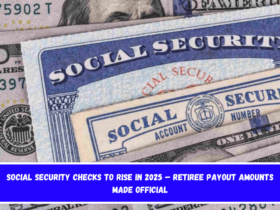When will the 2025 COLA raise happen next year? That’s what the Social Security Administration said. To top it all off, you can find out when your new payments will be if you are a US retiree.
This is also where new applicants and workers in their 50s or 60s can check to see if they can get these checks or direct payments from the Service. Check it out now if you don’t want to miss any information about how to get this money and who can get it.
The Social Security Administration (SSA) has announced that the COLA increase for 2025 will be around 2.5%. In other words, it will be about 0.7% less than in 2024 and 6.2% less than in 2023. Every year for the past ten years, COLAs have been about 2.6%. That means it will be 0.1% less in 2025. It’s still much better than a cut, though.
Who will get the first Social Security payments with the 2025 COLA increase?
Supplemental Security Income (SSI) payments, which are a federal benefit, will be the first to get the 2.5% increase. As a result, everyone who gets SSI will get a smaller-than-average raise on December 31, 2024. This will mean that people who get Supplemental Security Income will be the first to benefit from the 2025 COLA raise, which will happen in 2024.
After the SSI payment on December 31, 2024, Social Security plans to send another payment on January 3, 2025. So, this is the first payment in 2025 that includes the 2.5% cost of living increase. This paycheck will only go to two groups of people. On the one hand, it will be sent to some people who get Social Security Disability Insurance (SSDI).
On the other hand, it will also be delivered to some retirees. Bear in mind that there are just 2 ways to qualify for the January 3 payment:
- Having started receiving Social Security payments before May 1997
- Being an eligible recipient of the Supplemental Security Income payments while on retirement or SSDI

When will retirees and SSDI recipients will get the 2025 COLA increase if they do not qualify for a check on January 3?
Since SSI is sent on December 31, 2024, and those on SSI and Social Security, and pre-May 1997 recipients get it on the 3rd, others need to wait longer for their monthly payment.
Actually, the next round of payments after Jan. 3 will be issued on the second, third, and fourth Wednesday.
- Retirement or SSDI benefit payments will be due on January 8: if born from 1-10
- Retirement or SSDI benefit payments will be due on January 15: if your birthday is from 11-20
- Retirement or SSDI benefit payments will be due on January 22: If your birth date is from 21-31
What are the requirements to get Social Security retirement benefit payments in 2025?
People who work in the United States and meet certain rules can get Social Security payments. There are two of these conditions that must be met. If not, you won’t be able to use it.
In order to be able to get retirement benefits in 2025, workers must have racked up enough work points. From 2024 on, a worker must have at least 40 work points.
If you want to get Disability Insurance instead of retirement payments, this number of work or Social Security credits may be less. So, younger workers might not need as many points to get SSDI.
Remember that people can’t ask for retirement benefits until they are 62 years old. This is the youngest age at which a retiree can get money from the government.
The amount of money you need to earn each year to get up to 4 work credits has changed because of the 2025 COLA raise. Just so you know, you can get anywhere from one to four work credits a year.
The COLA Fact Sheet for Social Security says that the quarter of coverage will go up to $1,810 in 2025 from $1,730 in 2024. In order to get the same number of work credits, you will need to make more money. You can apply for Social Security when you turn 62 and have 40 credits. This is what you need to do in order to get payments when you retire.
Also See:- Increase in retirement benefits: changes in 2025











Leave a Reply